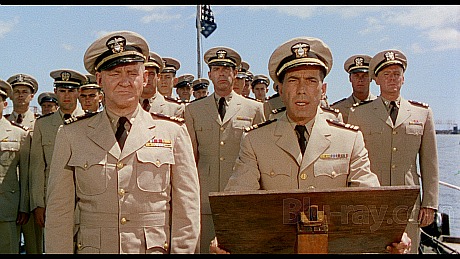I’m sorry but this scene is amusing, perfectly acted and shrewdly written, like the film itself. And the cool, calm and collected Christoph Waltz rules here like he never ruled in Inglourious Basterds.
 Jeffrey Wells
Jeffrey Wells
Little Steel Balls
A failing aspect-ratio grade is hereby given to Sony Home Video’s new Bluray of The Caine Mutiny, and particularly to Sony’s restoration guy Grover Crisp for approving a 1.85 masking of a film that was absolutely intended to be seen in a 1.33 or 1.66 to 1 aspect ratio.
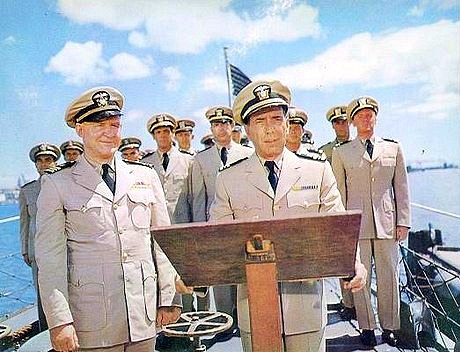
Same scene (although perhaps not same shot) with boxier cropping. What do we gain as viewers from not seeing a bit more sky, and a fuller view of the lecturn that Humphrey Bogart is standing behind?
Wider aperture plates were only just being introduced to theatres in 1953 and ’54 with The Robe, the very first CinemaScope film, debuting in ’53 and the need to simulate widescreen images relatively new. The Caine Mutiny was released on 6.24.54, and there’s no way in the world that Caine dp Franz Planer expected viewers to see this film within a 1.85 frame. Okay, maybe some stickler exhibitors in New York and Los Angeles might have projected it with 1.85 aperture plates, but Planer knew that most of the country would be looking at a boxier version. And Crisp knows that.
George Stevens‘ Shane was also shot in 1.33 and released only about 15 months before The Caine Mutiny, and you can bet no one at Paramount Home Video ever considered putting that classic on DVD with a 1.85 or 1.66 to 1 aspect ratio. Not a chance. You can bet that the people mastering the Gaumont Bluray of Jules Dassin‘s Rififi, which had its European debut in 1954, never dreamt of masking it off at 1.85.
Loyal Griggs‘ Shane cinematography won an Oscar, and I recall Pauline Kael writing that it was thought to be some kind of sick joke that the tops and bottoms of his images had been severed with a fake panoramic cropping of 1.66 to 1 when Shane played at the Radio City Music Hall.
The 1.85 Caine Mutiny Bluray is following the lead of the two or three DVD versions that came out between ’98 and ’07. The VHS and laser disc versions of The Caine Mutiny presented the film at a full 1.33 to 1 aspect ratio, which made it look very handsome indeed. But you know the old story. People want their 16 x 9 high-def screens to be completely filled when they watch their Blurays so the tops and bottoms were chopped off and to hell with what Planer and director Edward Dmytryk wanted people to see.
This is the worst mis-masking of a Bluray since Psycho, which also should have been released in 1.33. Or at least in two versions — 1.33 and 1.85.
I don’t believe for a second that Crisp would approve a 1.85 cropping of On The Waterfront, which was released on 7.28.54, or a month after The Caine Mutiny. And I don’t think Crisp would be crazy enough to approve a 1.85 masking of the long-delayed Bluray of From Here To Eternity, which opened in August of ’53. Can you imagine the outcry if a 1.85 cropping of Eternity on Bluray was released? But a 1.85 cropping of The Caine Mutiny draws nary a peep.
Hospitality
William F. Buckley‘s voice had a wonderfully deep timbre, and his chilly blue eyes had a faintly demonic glint as he was making his points against opponents. I’m asking myself if any TV interviewer today introduces guests in this slightly jaundiced way that seems to be saying to the viewer “this man or woman doesn’t pass muster according to my sights, and is possibly not be trusted.”
Nobody would dare do this today, and yet there was something delicious in Buckley’s way of putting his guests down. He was like a man who was masterful with a bullwhip snapping a fly off a horse’s ear.
Man In Mirror
Leaving aside the merits of the view that Obamacare and Romneycare are two sides of an evil coin, you have to give some creative credit to Perry’s advertising team for delivering a horror-film, lightning-flash, evil-twin image in Perry’s Romney-takedown ad, which has just been released. If a presidential candidate has ever used a horror flash-cut in a political ad before, I’m not aware of it. Here’s the ad, and Michael D. Shear‘s N.Y. Times story about it.
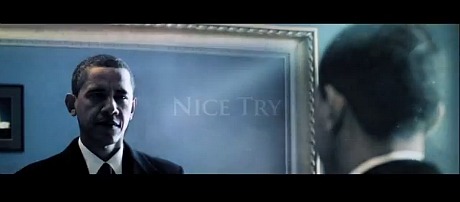
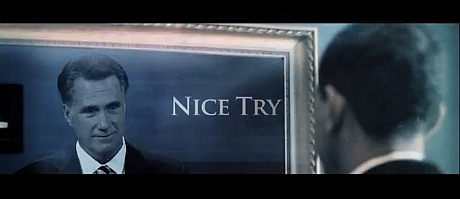
Appearances
The way to understand establishment hostility towards the Occupy Wall Street-ers, in the view of N.Y. Times columnist Paul Krugman, “is to realize that it’s part of a broader syndrome, in which wealthy Americans who benefit hugely from a system rigged in their favor react with hysteria to anyone who points out just how rigged the system is.
“Wall Street’s Masters of the Universe realize, deep down, how morally indefensible their position is. They’re not John Galt; they’re not even Steve Jobs. They’re people who got rich by peddling complex financial schemes that, far from delivering clear benefits to the American people, helped push us into a crisis whose aftereffects continue to blight the lives of tens of millions of their fellow citizens.
“Yet they have paid no price. Their institutions were bailed out by taxpayers, with few strings attached. They continue to benefit from explicit and implicit federal guarantees — basically, they’re still in a game of heads they win, tails taxpayers lose. And they benefit from tax loopholes that in many cases have people with multimillion-dollar incomes paying lower rates than middle-class families.
“This special treatment can’t bear close scrutiny — and therefore, as they see it, there must be no close scrutiny. Anyone who points out the obvious, no matter how calmly and moderately, must be demonized and driven from the stage. In fact, the more reasonable and moderate a critic sounds, the more urgently he or she must be demonized, hence the frantic sliming of Elizabeth Warren.
“So who’s really being un-American here? Not the protesters, who are simply trying to get their voices heard. No, the real extremists here are America’s oligarchs, who want to suppress any criticism of the sources of their wealth.”
Oscarball
Gold Derby‘s Tom O’Neil isn’t entirely sold on the term “Oscarball,” which I came up with yesterday to describe his new, in-depth, sabermetrics-styled polling and tabulation system on his reconfigured site.
But I think it’s a perfect way to describe his new vote-analysis software program (which has cost him a pretty penny), and it does seem to be a kind of Bill James/Billy Bean-ish way of sizing up award-season action by aggregating opinion from three sectors — so-called Oscar “experts”, Gold Derby editors and readers — and allowing participants to change favorites at the drop of a hat.
So it has more information, more varied participants and can be updated or changed by any participant day or night, twice on Sundays and as many times as they want. Which sounds to me like a more inclusive, particular and stat-intensive way of assessing the ups and downs of the Oscar season than what comes out of the comparatively myopic Gurus of Gold charts, which are basically a result of 14 pundits participating in a kind of instinctual mood-consensus circle-jerk.
Some of the Gold Derby “experts” are Gurus, and of course they stem from the same culture, but they represent a slightly broader consensus with 24 participants (with more to be added in the coming weeks).
The Gurus (i.e., Anthony Breznican, Greg Ellwood, Pete Hammond, Peter Howell, Dave Karger, Mark Olsen, David Poland, Steve Pond, Sasha Stone, Kris Tapley, Anne Thompson, Stu Van Airsdale and Susan Wloszczyna) are a smart bunch from a select fraternity, but they’re basically going on opinion, ether, experience, industry relationships and insect-antennae hunches in the same way those old Moneyball scouts have a liking for players with an attractive swagger and can hit the curve ball with a nice crack of the bat, or who don’t like players with ugly girlfriends because that indicates a lack of confidence.
So Tom O’Neil is Brad Pitt with a more detailed, stat-driven approach, trying to push the game along and open up the field, and David Poland is that Moneyball scout with the man-boobs inside a golf shirt (played by Kenny Medlock) who “can’t see it” and prefers the old seasoned-hunch game. You could look at it that way, I mean.

Myself and Tom O’Neil at the Sunset Towers hotel — Sunday, 10.9, 2:20 pm. (Photo by Awards Daily‘s Sasha Stone.)
I play that game myself 24/7 so I’m hardly pointing fingers, but the idea of aggregating more data from a broader field of sources (O’Neil says he’s looking to eventually get as many as 50 Oscar experts assembled) and allowing everyone to change their votes whenever the wind shifts seems like a more accurate way to read the tea leaves than the Poland 14 sending in ballots every other week or whatever.
You can also create a user account within Gold Derby world, “friend” other Derby folk and share your predictions all around. You can also assign a confidence factor to your predictions with dollar values of $100, $200 and $500. This is where it gets into Jimmy-the-Greek territory, which isn’t exactly my thing.
I don’t like what the Gurus have done in underlining and therefore perpetrating the syndrome of familiar (and therefore predictable) emotional defaults becoming favorites in this or that category. This tendency has to be fought tooth and nail (unless I agree with the emotional-default choice), and it seems to me that an opinion software that at least can reflect the changing mood of the room in a matter of minutes or hours is better than a chart that reflects what some people are thinking on a weekly or bi-weekly basis.
O’Neil plans to use this system to dig into the annual Emmy race and the Grammys and all the others, but I think that something along the lines what O’Neil is doing here would be more interesting way of assessing new releases than simply the critic-driven Rotten Tomatoes and Metacritic systems. Things have to change. They have to get smarter. You have to overturn the apple cart every four or five years and find a better game.
Marilyn Pushback
Nobody at the Weinstein Co. told me about last night’s 6 pm screening of My Week With Marilyn, which was more or less concurrent with the NY Film Festival evening showing. A friend told me about it at 5 pm while I was at a party, but it was too late to put down my glass of red wine and plate of food and hop on the scooter and go roaring over to the Wilshire screening room with a mild buzz-on. So I shined it.
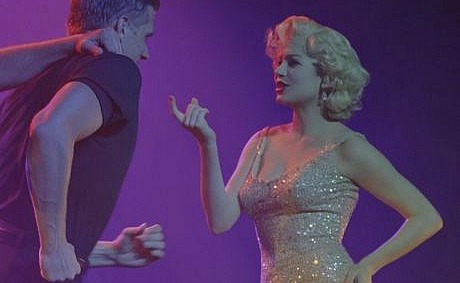
That aside three reviewers — Deadline‘s Pete Hammond, Variety‘s Ronnie Schieb and the Hollywood Reporter‘s David Rooney — are differing with Indiewire‘s Eric Kohn and other nip-nippers who put the film down yesterday afternoon following the NYFF press screening.
Hammond: “I have to confess that, after seeing some selected footage [from My Week With Marilyn] that was shown at the Weinstein party in Cannes last May, I had my doubts about Williams as Monroe. But those concerns were completely erased in the context of the entire film where she gets to show three distinctly different sides of the star without ever drifting into impersonation.
“Besides Williams, the film contains another surefire acting nominee in Kenneth Branagh‘s biting and all-knowing interpretation of Laurence Olivier.”
Schieb: “The film belongs to Williams, whose tour-de-force turn conflates three Marilyns: the lost, damaged little girl who seeks to escape others’ expectations and return to simpler childhood days; the sexy superstar who impishly poses with a wink in complicity with her public; and the actress playing a pre-scripted part. The genius of the performance lies in the way Williams stresses the interconnectedness of these personalities: The neediness fuels the impudence, the vulnerability turns sexually provocative, and the little girl and sexpot together drive the screen role.
Rooney: “The luminous Michelle Williams gives a layered performance that goes beyond impersonation in My Week With Marilyn. Playing both the damaged, insecure woman and the sensual celebrity construct, as well as the role with which Marilyn Monroe was struggling during a particularly difficult shoot, Williams gets us on intimate terms with one of Hollywood’s most enduring and tragic icons. If much of what surrounds her in Simon Curtis‘ biographical drama is less nuanced, her work alone keeps the movie entertaining.”

Oscar Poker #51
Awards Daily‘s Sasha Stone and I began yesterday morning with a box-office discussion with Boxoffice.com’s Phil Contrino for Oscar Poker 51. And then we did a Part 2 at the Sunset Towers with Gold Derby ‘s Tom O’Neil — partly a discussion of Tom’s new sabermetrics analysis engine — i.e., “Oscarball.” And partly a general discussion of Oscar season hopefuls. Here’s a non-iTunes, stand-alone link.

Not So Fast, Viola Davis!
Last night I mentioned the alleged inevitability of The Help‘s Viola Davis winning the Best Actress Oscar to an A-list director who was hosting a party at his home, and if anything his pulse rate dropped. His reaction to Davis in a word: “meh.” Not a nod that said “okay, yeah, maybe,” Not a half-enthusiastic “yeah, she’s good in that film” or “yeah, friends have told me they like her a lot in that film.” Just a shrug and a meh. And he knows a lot of working Academy people who know people, etc.
I’m not saying Davis isn’t an all-but-guaranteed nominee. She is. But don’t get too cocky about her being an all-but-certain winner.
This guy also told me he wasn’t all that turned on by Moneyball, and when I heard that my spirits sank.
Quikster Smothered In Crib
Netflix CEO Reed Hastings announced today that “it is clear that for many of our members two websites would make things more difficult, so we are going to keep Netflix as one place to go for streaming and DVDs. This means no change: one website, one account, one password… in other words, no Qwikster.”
Hugo Pot
Update: Deadline‘s Michael Fleming is reporting that tonight’s NYFF “work in progress’ sneak is definitely Martin Scorsese‘s Hugo.
Previously: Last night Deadline‘s Pete Hammond seemed to more or less agree with what I posted on Friday about Martin Scorsese‘s Hugo most likely being the “work in progress” sneak that’ll screen tonight at the New York Film Festival. The tweets confirming yea or nay will appear just before 4 pm Pacific/7pm Eastern.
Hammond adds that “a Paramount source who knows these things guessed it was [Stephen Daldry‘s] Extremely Loud and Incredibly Close while strongly indicating it wasn’t Hugo.” The source asked Hammond, “Do you really think Martin Scorsese would premiere his movie that way?”
What does that mean? At the New York Film Festival in early October? That’s about as classy a launch pad for a quality-level fall film as I can imagine, and obviously a prominent one.
That guy who saw Hugo in Chicago in mid-September answers Hammond’s Paramount source as follows: “It makes sense that they’re screening [Hugo] early. Contrary to the trailer’s portrayal, this isn’t really a kid movie. Frankly, I think kids’ll be bored with it. It’s a movie made for cineastes. If they try to sell this directly to families, it’s going to tank. They really need to get the erudite snobs talking about this one.”

